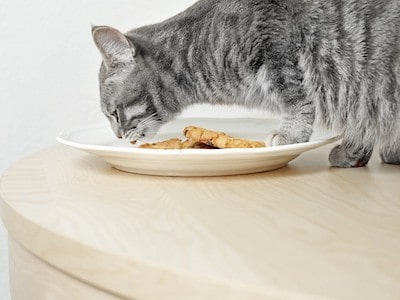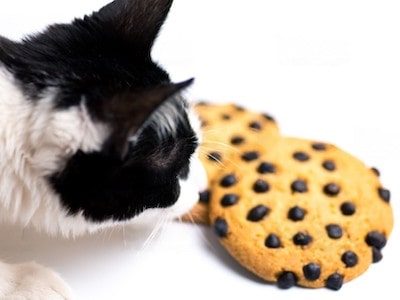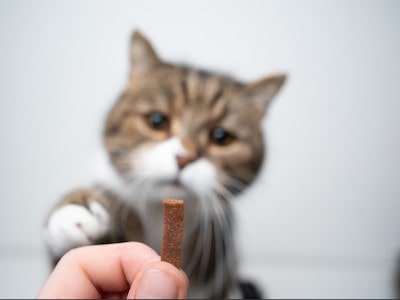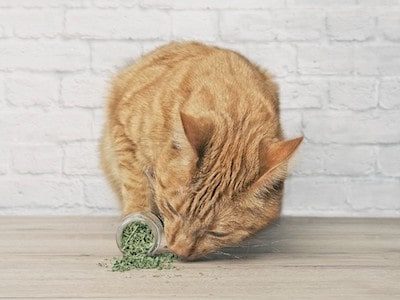If you’re anything like me, you know that sharing food with our pets is one of life’s greatest pleasures. But as much as we love spoiling our furry friends with treats, it’s crucial to remember that not everything we eat is safe for them to consume.
This is especially true when it comes to cookies, a classic indulgence that many of us can’t resist. As a cat owner, I’ve often wondered whether my beloved feline friends can join in on the fun and indulge in a cookie or two.

So, let’s dive into the topic and find out whether our purring pals can safely indulge in this delicious treat.
Get ready to explore some surprising facts, learn about some safe alternatives, and of course, discover whether your cat is truly a cookie monster at heart.
Can Cats Have Cookies?
When we talk about feeding our cats, it’s crucial to keep in mind that they have particular requirements for their food. Unlike dogs who enjoy almost everything edible, cats are quite choosy when it comes to eating. So, is it okay for our feline pals to have cookies? The answer isn’t straightforward and needs some explanation.
When giving cookies to cats, we should check the ingredients first. We need to avoid using chocolate, raisins and macadamia nuts as these can be harmful for them.

Furthermore, since cookies usually contain high amounts of sugar and fat, it’s best not to feed them too much because it may lead to stomach problems or even make our felines overweight.
It’s important to remember that just like humans, some cats have food allergies or sensitivities. Certain ingredients in cookies could trigger these reactions in them. Before sharing a cookie with your feline friend, make sure you read the label carefully and avoid any harmful ingredients.
With that being said, some cookies can be eaten by cats in moderation without any risks. For instance, plain sugar cookies are usually safe for them as long as they don’t contain any harmful substances.
Although cats can technically eat cookies, it’s not usually a good idea. If you want to give your furry buddy something that is both safe and nutritious, there are many other options available.
The Risks of Feeding Cats Cookies
Feeding cats cookies can be risky and potentially harmful to their health. Here are six risks associated with feeding cats cookies and an explanation of each risk:

- High sugar content: Cookies are generally high in sugar, which can lead to obesity and diabetes in cats. The high sugar content can also cause dental problems, including decay and tooth loss.
- Digestive issues: Cats have a sensitive digestive system and are not able to digest certain ingredients found in cookies, such as wheat, corn, and soy. These ingredients can cause digestive issues, including vomiting, diarrhea, and constipation.
- Chocolate toxicity: Chocolate is toxic to cats and can cause serious health problems, including seizures and even death. Some cookies contain chocolate chips, making them unsafe for cats.
- Raisin toxicity: Raisins are also toxic to cats and can cause kidney failure. Some cookies contain raisins or dried fruits, making them potentially dangerous for cats to eat.
- Xylitol toxicity: Xylitol is a sugar substitute found in some cookies that can be toxic to cats. It can cause insulin release, leading to hypoglycemia (low blood sugar), seizures, and liver failure.
- Allergic reactions: Cats can have allergies to certain ingredients found in cookies, such as dairy, eggs, and gluten. Allergic reactions can cause itching, swelling, and even difficulty breathing in severe cases.
What to Do If Your Cat Eats Cookies
If your cat eats cookies, it is important to take action immediately to prevent any potential health issues. Here are the steps you should take if your cat eats cookies:

- Remove any remaining cookies: If there are still cookies within your cat’s reach, remove them immediately to prevent further consumption.
- Monitor your cat: Watch your cat closely for any signs of illness, such as vomiting, diarrhea, or lethargy. If your cat exhibits any of these symptoms, contact your veterinarian right away.
- Check the ingredients: Take note of the ingredients in the cookies your cat consumed. If the cookies contained chocolate, raisins, or xylitol, contact your veterinarian immediately.
- Call your veterinarian: Contact your veterinarian and provide them with as much information as possible, including the type and amount of cookies your cat ate, the time of ingestion, and any symptoms your cat is experiencing.
- Follow your veterinarian’s advice: Your veterinarian may recommend bringing your cat in for an examination or administering treatment at home. Follow their advice closely to ensure the best possible outcome for your cat.
- Prevent future incidents: To prevent future incidents, keep cookies and other potentially harmful human foods out of your cat’s reach. Consider providing your cat with safe, cat-friendly treats instead.
Alternatives to Cookies for Cats
While cookies are not a safe treat for cats, there are many alternatives that can be given to them instead. Here are some safe and healthy treats that cats can enjoy:
- Commercial cat treats: You can find plenty of cat treats in the market that are specially made to meet your feline friend’s nutritional requirements and won’t cause any harm. Just make sure to choose treats with top-quality ingredients, without any fake colors, flavors or preservatives.

- Cooked meats: If you want to give your cat a treat, cooked meats like chicken, turkey and beef are safe for them to eat as they are carnivorous animals. Just make sure that the meat does not have any bones or fat in it before giving it to your furry friend.

- Fish: Cats love to eat fish, especially canned tuna or salmon. But be careful not to give them too much because it can cause thiamine deficiency.
- Fruits and vegetables: Just like humans, some cats have a liking for fruits and veggies. Cooked carrots, green beans or blueberries in small quantities can be relished by them. It is important to note that every cat may not share the same preference, so it’s advisable to introduce new foods gradually and monitor any negative responses closely.
- Catnip: Catnip is a safe and natural herb that many cats enjoy. You can offer your cat fresh or dried catnip leaves as a treat, or use it to make homemade cat toys.

FAQs
Why can’t cats eat some human foods?
Cats have unique dietary needs and certain human foods can be harmful to their health. Some human foods, such as chocolate, onions, garlic, grapes, and alcohol, can be toxic to cats, while others, such as dairy products, can cause digestive issues.
Can feeding my cat cookies lead to long-term health problems?
Feeding your cat cookies on a regular basis can contribute to obesity, dental issues, and other long-term health problems. It’s best to stick to a balanced diet that is specifically formulated for cats and to limit treats to occasional, safe options.
What are the symptoms of chocolate toxicity in cats?
Symptoms of chocolate toxicity in cats can include vomiting, diarrhea, restlessness, hyperactivity, tremors, seizures, and heart arrhythmias. If you suspect your cat has ingested chocolate, contact your veterinarian immediately.
How often can I give my cat treats?
Treats should be given in moderation and as part of a balanced diet. Consult with your veterinarian to determine the appropriate amount and frequency of treats for your cat’s individual needs.
Well, It’s a Wrap
In conclusion, feeding cats cookies is not recommended due to the potential risks and health issues they can cause. Cookies are often high in sugar, contain ingredients that cats cannot digest, and some types of cookies can be toxic to cats.
If your cat accidentally ingests cookies, it’s important to monitor them closely for any symptoms and contact your veterinarian for guidance. Instead of cookies, there are many safe and healthy treat options available for cats, such as commercially available cat treats, cooked meats, fish, fruits and vegetables, and catnip.
By providing your cat with safe and appropriate treats in moderation, you can help promote their health and well-being.

Charlene Pare is the founder of Cat Likes Best. She manages and strategizes the content published on this website. When she isn’t working, she enjoys exploring the city around with her Ameican Shorthair kitty–Moli. Being a technocrat and an avid cat lover, she also writes on pet tech products and some of the featured articles.




